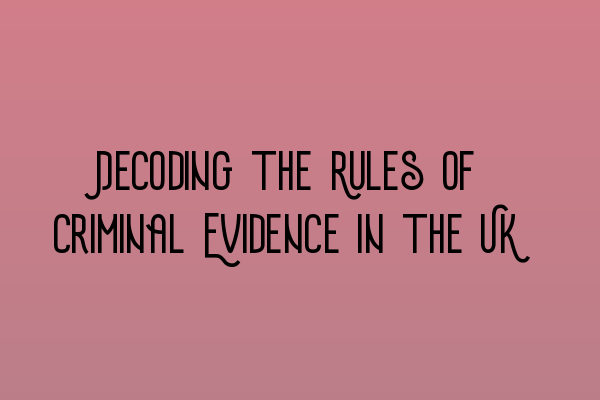Decoding the Rules of Criminal Evidence in the UK
When it comes to criminal law in the UK, one of the most critical aspects is the rules of criminal evidence. Understanding these rules is essential for both legal professionals and those with a general interest in the criminal justice system. In this comprehensive guide, we will decode the rules of criminal evidence in the UK, shedding light on important concepts and providing valuable insights into the legal process.
The Importance of Criminal Evidence
Before delving deeper into the rules of criminal evidence, it’s essential to understand why evidence plays such a crucial role in criminal cases. In any criminal prosecution, the burden of proof rests entirely on the prosecution. The prosecution must present evidence that proves the guilt of the accused beyond a reasonable doubt.
The rules of criminal evidence ensure that the evidence presented in court is reliable, relevant, and properly obtained. Adhering to these rules promotes fairness, ensures the integrity of the criminal justice system, and protects the rights of the accused.
The Admissibility of Evidence
Not all evidence is admissible in a criminal trial. The admissibility of evidence is governed by various rules and principles. One fundamental principle is that evidence must be relevant to the case at hand. Irrelevant evidence may be excluded from trial as it does not assist in establishing the guilt or innocence of the accused.
Another important aspect of admissibility is the manner in which evidence is obtained. Evidence obtained through illegal searches or in violation of a person’s rights may be deemed inadmissible. The exclusionary rule ensures that improperly obtained evidence is not used against the accused in court.
The Hearsay Rule
One of the most well-known rules of criminal evidence is the hearsay rule. Hearsay refers to an out-of-court statement offered for the truth of the matter asserted. In general, hearsay is considered unreliable and is therefore excluded from trial.
However, there are exceptions to the hearsay rule. For example, statements made by a person who is unavailable to testify in court may be admissible under certain circumstances. Additionally, hearsay may be admissible if it falls under a recognized exception, such as statements made in the ordinary course of business or dying declarations.
Expert Evidence
Expert evidence is another crucial aspect of criminal trials. Expert witnesses, with their specialized knowledge and expertise, play a vital role in providing the court with objective and scientific opinions. However, the admissibility of expert evidence is subject to certain criteria.
The court must determine whether the expert witness is qualified to give the opinion they present. They will assess the expert’s qualifications, experience, and the methodology employed to reach their conclusions. Additionally, the court must also consider whether the evidence will be helpful to the trier of fact in understanding the case.
Conclusion
Understanding the rules of criminal evidence is vital for individuals interested in the UK criminal justice system and legal professionals alike. These rules ensure the fair and just administration of justice, protecting the rights of the accused and ensuring the reliability of evidence presented in court.
For more information about the SQE Criminal Law & Practice and to prepare effectively for the exams, make sure to check out our related articles:
